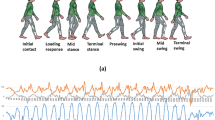Abstract
This paper deals with a problem of recognition by gait when time-dependent covariates are added, i.e. when 6 months have passed between recording of the gallery and the probe sets. We show how recognition rates fall significantly when data is captured between lengthy time intevals, for static and dynamic gait features. Under the assumption that it is possible to have some subjects from the probe for training and that similar subjects have similar changes in gait over time, a predictive model of changes in gait is suggested in this paper, which can improve the recognition capability. A small number of subjects were used for training and a much large number for classification and the probe contains the covariate data for a smaller number of subjects. Our new predictive model derives high recognition rates for different features which is a considerable improvement on recognition capability without this new approach.
Preview
Unable to display preview. Download preview PDF.
Similar content being viewed by others
References
Bobick, A.F., Johnson, A.: Gait extraction and description by evidence-gathering. In: Bobick, A.F., Johnson Gait, A. (eds.) Proceedings of IEEE Computer Society Conference on Computer Vision and Pattern Recognition, pp. 423–430 (2001)
Collins, R., Gross, R., Shi, J.: Silhouette-based human identification from body shape and gait. In: Proceedings of the International conference on Automatic Face and Gesture Recognition, Washington, DC (2002)
Cunado, D., Nixon, M.S., Carter Automatic, J.N.: extraction and description of human gait models for recognition purposes. Computer Vision and Image Understanding 90(1), 1–41 (2003)
Huang, P.S., Harris, C.J., Nixon Recognizing, M.S.: humans by gait via parametric canonical space. Artificial Intiligence in Engineering 13(4), 359–366 (1999)
Kale, N. Cuntoor, and R. Chellapa A framework for activity-specific human recognition Proceedings of IEEE International conference on Acoustics, Speech and Signal Processing, Orlando, Fl,, 2002
Lanitis, A., Taylor, C.J., Cootes, T.F.: Modeling the process of ageing in face images. In: Proceedings of the Seventh IEEE International Conference on Computer Vision, vol. 1, pp. 131–136 (1999)
Lanitis, A., Taylor Towards, C.J.: automatic face identification robust to ageing variation. In: Proceedings of Fourth IEEE International Conference on Automatic Face and Gesture Recognition, pp. 391–396 (2000)
Lanitis, A., Taylor, C.J., Cootes, T.F.: Toward Automatic Simulation of Aging Effects on Face Images. IEEE Transactions on Pattern Analysis and Machine Intelligence 24(4), 442–455 (2002)
Lanitis, A., Draganova, C., Christodoulou, C.: Comparing different classifiers for automatic age estimation. IEEE Transactions on Systems, Man, and Cybernetics- PartB: Cybernetics 34(1), 621–628 (2004)
Lee, L., Grimson, W.E.L.: Gait analysis for recognition and classification. In: Proceedings of the IEEE International Conference on Face and Gesture, pp. 155–161 (2002)
Liu, Z., Sarkar, S.: Simplest Representation Yet for Gait Recognition: Averaged Silhouette. In: Proceedings of the 17th International Conference on Pattern Recognition, vol. 2, pp. 704–711 (2004)
Liu, Z., Malave, L., Sarkar, S.: Studies on Silhouette Quality and Gait Recognition. In: Proceedings of the IEEE Computer Society Conference on Computer Vision and Pattern Recognition, vol. 4, pp. 211–214 (2004)
Liu, Z., Sarkar, S.: Effect of Silhouette Quality on Hard Problems in Gait Recognition. Accepted for future publication IEEE Transactions on Systems, Man, and Cybernetics- PartB: Cybernetics (2005)
O’Toole, A.J., Vetter, T., Volz, H., Salter, E.: Three-dimensional caricatures of human heads: distinctiveness and the perception of age. Perception 26, 719–732 (1997)
O’Toole, A.J., Price, T., Vetter, T., Bartlett, J.C., Blanz, V.: 3D shape and 2D surface textures of human faces: The ‘Role’of ‘averages in atractiveness and age. Image and Vision Computing 18(1), 9–20 (1999)
Phillips, P., Blackburn, D., Bone, M., Grother, P., Micheals, R., Tabassi, E.: Face recognition vendor test 2002, FRVT 2002 (2002), Available at http://www.frvt.org/FRVT2002/default.htm
Sarkar, S., Phillips, P.J., Liu, Z., Vega, I.R., Grother, P., Bowyer, K.V.: The HumanID Gait Challenge Problem: Data sets, Performances, and Analysis. IEEE Transactions on Pattern Analysis and Machine Intelligence 27(2), 162–177 (2005)
Shutler, J.D., Grant, M.G., Nixon, M.S., Carter, J.N.: On a large sequencebased human gait database. In: Proc. 4th International Conf. on Recent Advances in Soft Computing, Nottingham, UK, pp. 66–72 (2002)
Socolinsky, D.A., Selinger, A.: Thermal face recognition over time. In: Proceedings of the 17th International Conference on Pattern Recognition, vol. 4, pp. 187–190 (2004)
Veres, G.V., Gordon, L., Carter, J.N., Nixon, M.S.: What image information is important in silhouette-based gait recognition? In: Proceedings of IEEE Computer Society Conference on Computer Vision and Pattern Recognition, Washington, D.C., USA, vol. II, pp. 776–782 (2004)
Veres, G.V., Gordon, L., Carter, J.N., Nixon, M.S.: Feature extraction or feature selection in silhouette-based gait recognition? Submitted to Pattern Recognition
Wagg, D.K., Nixon Automated, M.S.: markless extraction of walking people using deformable contour models. Computer Animation amd Virtual Worlds 15(3), 399–406 (2004)
Wang, L., Hu, W.M., Tan, T.N.: A new attempt to gait-based human identification. IEEE Transactions on Circuits and Systems for Video Technology 14(2), 149–158 (2002)
Author information
Authors and Affiliations
Editor information
Editors and Affiliations
Rights and permissions
Copyright information
© 2005 Springer-Verlag Berlin Heidelberg
About this paper
Cite this paper
Veres, G.V., Nixon, M.S., Carter, J.N. (2005). Modelling the Time-Variant Covariates for Gait Recognition. In: Kanade, T., Jain, A., Ratha, N.K. (eds) Audio- and Video-Based Biometric Person Authentication. AVBPA 2005. Lecture Notes in Computer Science, vol 3546. Springer, Berlin, Heidelberg. https://doi.org/10.1007/11527923_62
Download citation
DOI: https://doi.org/10.1007/11527923_62
Publisher Name: Springer, Berlin, Heidelberg
Print ISBN: 978-3-540-27887-0
Online ISBN: 978-3-540-31638-1
eBook Packages: Computer ScienceComputer Science (R0)




